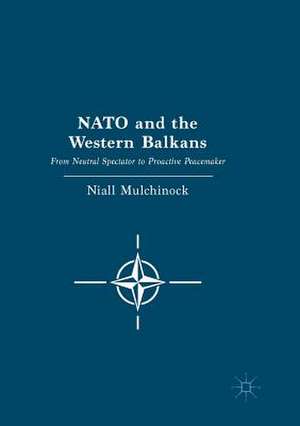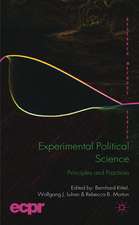NATO and the Western Balkans: From Neutral Spectator to Proactive Peacemaker
Autor Niall Mulchinocken Limba Engleză Paperback – 12 iul 2018
| Toate formatele și edițiile | Preț | Express |
|---|---|---|
| Paperback (1) | 639.08 lei 6-8 săpt. | |
| Palgrave Macmillan UK – 12 iul 2018 | 639.08 lei 6-8 săpt. | |
| Hardback (1) | 730.65 lei 6-8 săpt. | |
| Palgrave Macmillan UK – 4 apr 2017 | 730.65 lei 6-8 săpt. |
Preț: 639.08 lei
Preț vechi: 751.86 lei
-15% Nou
Puncte Express: 959
Preț estimativ în valută:
122.28€ • 128.02$ • 101.18£
122.28€ • 128.02$ • 101.18£
Carte tipărită la comandă
Livrare economică 05-19 aprilie
Preluare comenzi: 021 569.72.76
Specificații
ISBN-13: 9781349955701
ISBN-10: 1349955701
Pagini: 293
Ilustrații: XXIV, 293 p. 28 illus.
Dimensiuni: 148 x 210 mm
Greutate: 0.38 kg
Ediția:Softcover reprint of the original 1st ed. 2017
Editura: Palgrave Macmillan UK
Colecția Palgrave Macmillan
Locul publicării:London, United Kingdom
ISBN-10: 1349955701
Pagini: 293
Ilustrații: XXIV, 293 p. 28 illus.
Dimensiuni: 148 x 210 mm
Greutate: 0.38 kg
Ediția:Softcover reprint of the original 1st ed. 2017
Editura: Palgrave Macmillan UK
Colecția Palgrave Macmillan
Locul publicării:London, United Kingdom
Cuprins
1. Introduction.- 2. A Reluctance to Intervene: NATO and the First Years of the Yugoslav Conflicts (1990-1994).- 3. Bosnia Phase 2 and a More Pro-Active Stance by the Alliance (1994-1995).- 4. Kosovo - NATO's War (1998-1999).- 5. NATO's Peace Support Interventions in the Balkans Since 1995 (Phase 1 Bosnia).- 6. NATO's Peace Support Interventions in the Balkans Since 1995 (Phase 2 Kosovo).- 7. NATO's Peace Support Interventions in the Balkans Since 1995 (Phase 3 The former Yugoslav Republic of Macedonia).- 8. Conclusion
Recenzii
“The book is a fascinating read for anyone interested in NATO or the Yugoslav wars. It is a comprehensive study of NATO’s adjustment to the post-Cold War world, its almost reluctant involvement in the military interventions in Yugoslavia, and its subsequent leading role in peacekeeping missions.” (Roos Hoebens, Südosteuropa, Vol. 66 (1), 2018)
Notă biografică
Niall Mulchinock is a lecturer in the Department of Government at University College Cork (UCC), Ireland. He completed a BA at UCC in 2005, followed by a Masters in 2006. He then undertook a PhD in the Department of Government, again at UCC, examining NATO’s involvement in the stabilisation of the Western Balkans since the disintegration of Yugoslavia. His primary research interests lie in the field of international relations, with a particular focus on how NATO has changed and adapted to the new global security environment that emerged after the end of the Cold War.
Textul de pe ultima copertă
This book provides a critical examination of NATO’s evolving strategic and operational roles in the Western Balkans since the disintegration of Yugoslavia in 1991, with a particular focus on Bosnia, Kosovo and the former Yugoslav Republic of Macedonia, in both the conflict and post-conflict phases. While there is a myriad of literature available on the various conflicts that engulfed the former Yugoslavia after the collapse of communism, less has been written on NATO’s overall role in these conflicts. This text, therefore, fills the gap, offering a thematic study of NATO’s roles and duties in this region from the early 1990s to the present day. The ‘levels of analysis’ introduced by Mulchinock provide a new framework for examining NATO’s response to the Yugoslav wars of secession, focusing on the role of key NATO member states and the role of different NATO Secretaries-General, along with the impact of inter-institutional cooperation (and conflict) with other international organisations.
Caracteristici
Highlights NATO's role in the Western Balkans from 1991-2016 Focuses on NATO's role in Bosnia, Kosovo and the former Yugoslav Republic of Macedonia, in both the conflict and post-conflict phases Identifies previously underestimated factors in the analysis of NATO’s role in the Yugoslav conflicts














